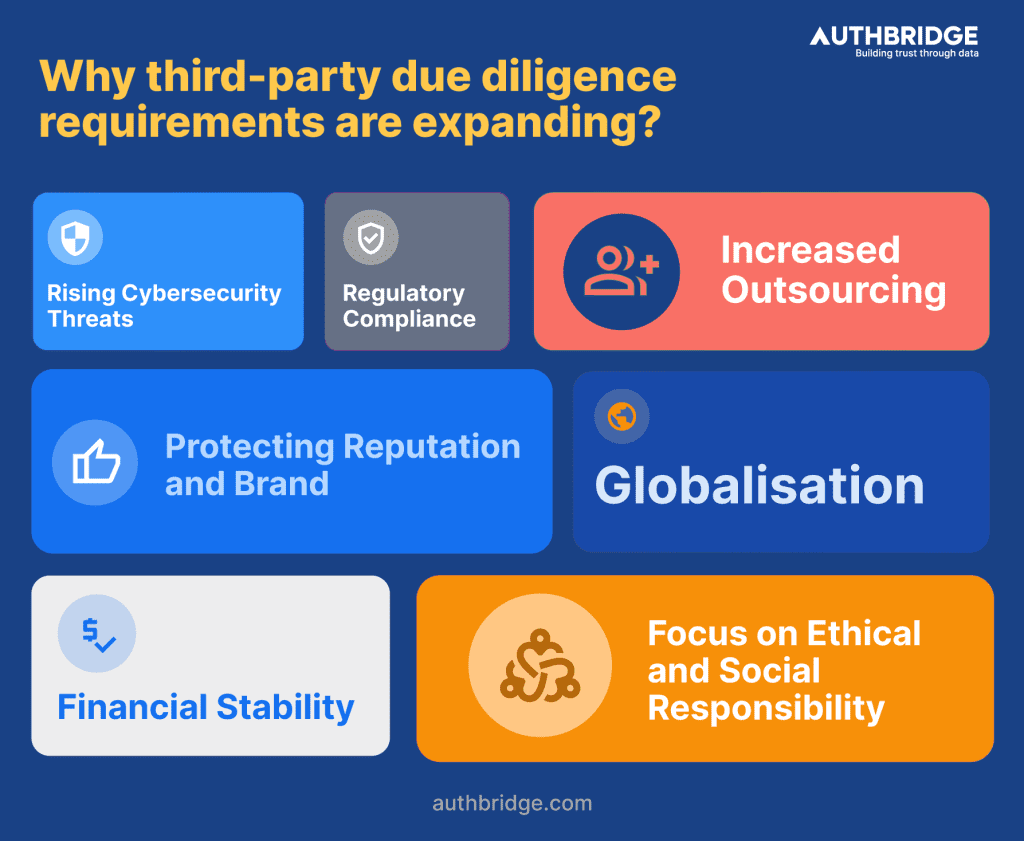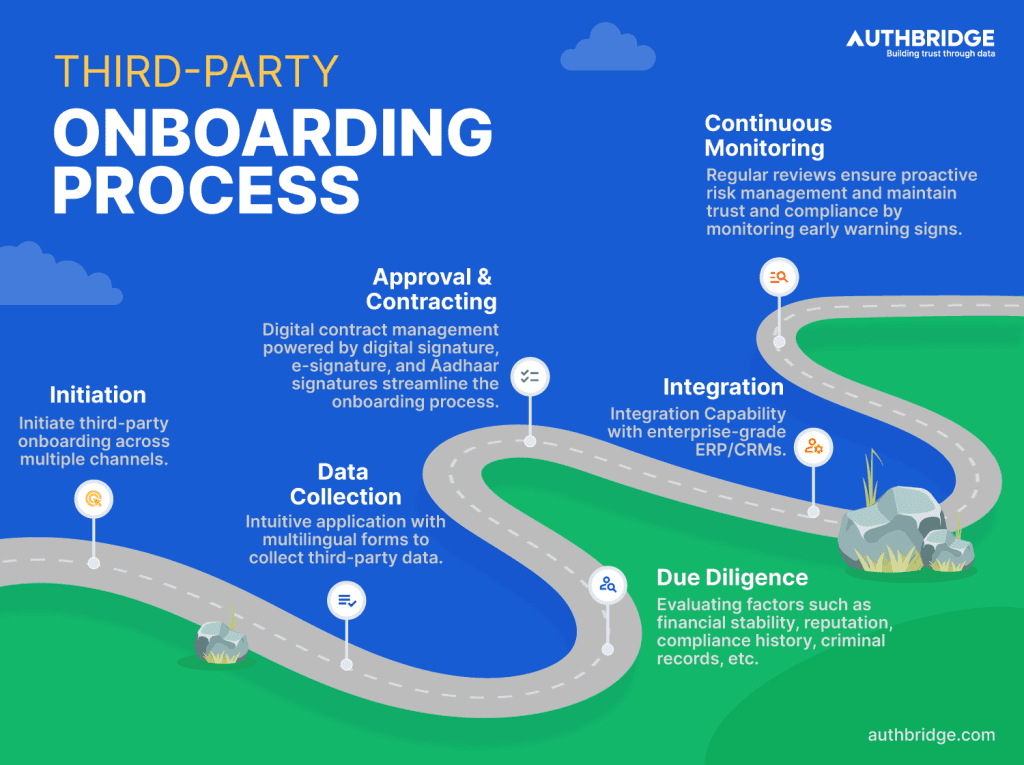In today’s intricate business landscape, third-party risk management (TPRM) and due diligence have become paramount for enterprises seeking to safeguard their operations, reputation, and compliance. Businesses rely on numerous third parties to ensure seamless operations, increase profitability, and achieve a faster go-to-market. Third parties such as suppliers, dealers, distributors, vendors, and merchants play an integral part in managing different supply chain functions, overcoming the demand-supply complexities, filling the gaps for smoother operations, and expanding channels to customers.
As supply chains become more complex and interconnected, the risks associated with vendors and suppliers multiply. To combat this, organisations are extending their due diligence efforts to mitigate risks related to third-party dependencies, geopolitical instability, environmental sustainability, and other factors that could disrupt their operations. With a robust due diligence solution, businesses can assess unforeseen risks and vulnerabilities, exposing a business to reputational, regulatory, and financial risks.
Therefore, choosing the right TPRM and due diligence is no longer optional – it is a strategic decision to assess the hidden risks at a much earlier stage and maintain the success and resilience of your business.
Why Vendor due diligence requirements are expanding?

- Rising Cybersecurity Threats: With the proliferation of cyber threats and data breaches, organisations are under pressure to ensure that their vendors have robust cybersecurity measures in place. Vendor due diligence now often includes assessing a vendor’s cybersecurity policies, procedures, and infrastructure to mitigate the risk of data breaches and cyberattacks.
- Regulatory Compliance: Regulatory bodies are becoming increasingly stringent in their requirements for due diligence. This is particularly true in industries such as finance, healthcare, and technology, where there are significant risks related to data security, financial integrity, and regulatory compliance. Regulations such as GDPR, HIPAA, SOX, and various anti-money laundering (AML) laws necessitate thorough due diligence processes to ensure vendors comply with legal requirements.
- Increased Outsourcing: Many organisations outsource their operations to third-party vendors to reduce costs and focus on core competencies. With this increased reliance on vendors, there’s a greater need to thoroughly vet and monitor them to ensure they meet the organisation’s standards and requirements.
- Protecting Reputation and Brand: Organizations recognise that their reputation and brand can suffer significant damage if a vendor is involved in unethical practices, data breaches, or other scandals. Conducting thorough due diligence helps mitigate these risks by identifying potential issues before they escalate.
- Globalisation: With businesses operating on a more global scale, vendor due diligence must account for differences in laws, regulations, and cultural practices across different regions. This complicates the due diligence as organisations must comply with various international standards and regulations.
- Financial Stability: Assessing third parties’ financial stability has become increasingly important, especially in uncertain economic times. Organisations want to ensure that their vendors have the financial strength to fulfil their contractual obligations and avoid disruptions to their operations.
- Focus on Ethical and Social Responsibility: Organizations are under increasing pressure to ensure their vendors adhere to ethical and socially responsible practices. This includes labour practices, environmental impact, diversity and inclusion policies, and adherence to human rights standards.
How does third-party due diligence make a difference?
Third-party due diligence involves implementing checks and balances within your new vendors, suppliers, or third-party onboarding journeys to mitigate risks. This process usually involves reviewing the onboarding contract, third-party completed assessments, external intelligence, and continuous monitoring to identify and prevent risks proactively.
All of this is weighed against your organisation’s level of risk tolerance.
End-to-end visibility throughout the Third-Party Onboarding Lifecycle

So, before onboarding a TPRM and due diligence vendor, conducting thorough research and asking the right questions is essential.
What type of questions across what categories you should consider?
In this comprehensive guide, we’ll explore the key inquiries to consider when selecting a TPRM and due diligence vendor.
Understanding Your Needs
- What are your specific risk management and due diligence requirements?
Define your organisation’s risk appetite, compliance obligations, and business objectives to identify the scope and priorities for TPRM and due diligence efforts.
- Which industries do you operate in, and what are the associated regulatory challenges?
Different industries face unique regulatory landscapes and compliance demands. Ensure your vendor understands your industry’s nuances to deliver tailored solutions. For example, a financial institution may prioritise rigorous financial checks to ensure regulatory compliance and mitigate financial risks. In contrast, a technology company may prioritise cybersecurity assessments due to the sensitive nature of the data involved. Manufacturing and e-commerce companies will emphasise criminal and court record checks more.
- What core areas do you want your third-party risk management solutions provider to conduct due diligence efficiently to meet your needs? Does your vendor provide comprehensive verification?
When considering a vendor to conduct due diligence efficiently, there are several core areas you need to prioritise to ensure your due diligence needs are met comprehensively. These areas include:
- Corporate Identity Checks: Authenticity of the corporate identity of third-party/business partner to establish trust and reliability in their services.
- Financial Standing: Assessing the financial stability and performance to gauge third parties’ capacity to fulfil obligations and sustain long-term partnerships.
- Criminal Checks: Conduct checks on criminal watchlists to mitigate risks associated with a history of unlawful activities of third parties.
- Court Records Checks: Reviewing court records data to discover past legal issues or disputes involving the vendor, offering valuable context for decision-making.
- Compliance Assessment Checks: Ensuring compliance with relevant regulations and industry standards to mitigate legal and reputational risks.
- Reputational Checks: Evaluating a company’s reputation within the industry and among previous clients helps gauge its credibility and track record of delivering quality services.
Before selecting a due diligence solution provider, businesses must establish their priorities to ensure that their specific needs are met effectively. Knowing priorities is essential for the following reasons:
- Tailored Due Diligence Approach: Different businesses have varying risk tolerances and compliance requirements. As discussed above, understanding your needs help you get tailored support and ensures all clients benefit from comprehensive verification services. It demonstrates the vendor’s commitment to inclusivity and customer satisfaction, enhancing its appeal as a reliable partner.
- Industry-Specific Expertise: Industries such as healthcare, finance, and energy have unique regulatory frameworks and compliance standards. A due diligence provider with industry-specific expertise can offer tailored solutions that address sector-specific risks and challenges.
- Geographical Coverage: Businesses operating globally or engaging with international partners require due diligence providers capable of conducting checks across different jurisdictions. Assessing a provider’s global reach and access to local databases is crucial for comprehensive coverage.
Stakeholders Involvement in Vendor Selection
- Who will be the internal stakeholders and decision-makers?
When selecting a solution vendor for your TPRM needs, assess who should be on the evaluation team and purchasing committee. The internal evaluation team and the purchasing committee can include key stakeholders such as members from procurement, finance, operations, the CFO, the COO, the risk officer, the compliance head, etc.
- And who are the external stakeholders contributing to the vendor selection process?
External stakeholders from the vendor’s side, including their product, compliance, operations, legal teams, and support, will also actively participate in the selection process to ensure mutual alignment and compatibility.
Evaluating Vendor Capabilities
- What is the vendor’s expertise in TPRM and due diligence?
It’s crucial to thoroughly assess a vendor’s track record, experience, and industry reputation in providing Third-Party Risk Management (TPRM) and due diligence services.
Look for certifications, awards, market presence, and client testimonials as vital indicators of competence. Doing so ensures you partner with a trusted, reliable provider who can effectively mitigate risks and safeguard your business interests.
- What is the due diligence process and the tech stack of the due diligence provider?
Inquire about the vendor’s approach to risk identification, analysis, and mitigation. Determine if they leverage advanced technologies, data analytics, and industry best practices to enhance the effectiveness of their processes.
Also, assess if the vendor you choose offers online and offline verification capabilities to ensure comprehensive coverage, even in some exceptional coverage.
- How comprehensive is the vendor’s data coverage and intelligence network?
Verify the breadth and depth of the vendor’s data sources, including global databases, regulatory repositories, and proprietary networks. Robust data coverage ensures thorough due diligence and risk monitoring capabilities.
- Does the vendor comply with relevant regulations and industry standards?
Confirm that the vendor adheres to applicable laws, regulations (e.g., GDPR, CCPA), and industry standards (e.g., ISO 27001) governing data privacy, security, and due diligence practices.
- How does the vendor protect sensitive information and maintain data integrity?
Inquire about the vendor’s data security protocols, encryption methods, and access controls to safeguard confidential information. Ensure they have robust measures to prevent data breaches and unauthorised access.
- What is the continuous monitoring protocol?
Continuous risk management calls for continuous monitoring of your third parties. Look for a due diligence solutions provider that has robust technology and processes in place for the same.
Assess key risk indicators among your third parties on an ongoing basis. Ensure your vendor offers continuous monitoring to enable early detection of any emerging issues or red flags with third parties. Whether it’s changes in financial health, operational disruptions, or unethical conduct, prompt identification allows organisations to take corrective actions before problems escalate.
Assessing Flexibility and Scalability
- Is the solution scalable and flexible?
As your business grows and operations change, your due diligence needs will evolve. You might need to expand into high-risk regions or cater to more high-risk clients. Perhaps a due diligence task that rarely happened before—that you sometimes used to perform manually—now needs to happen at an automated scale.
The due diligence solution you use should be flexible enough to meet changing requirements. The integration capabilities and ease of plugging it into your third-party onboarding journeys to onboard more vendors, suppliers, distributors, dealers, etc, faster.
Additionally, the solution provider should have a global database or partnerships to help you verify the businesses operating internationally.
- How customizable is the product offering?
An effective due diligence and risk management solution provider would be the one who understands your business requirements and provides a tailor-made solution. Whether they want a QR-based journey or custom approval flow to make processes efficient for them and make your business build trust among your partners.
- How can the vendor handle diverse third-party relationships and risk scenarios?
Evaluate the vendor’s ability to address various risk factors, from financial stability and regulatory compliance to reputational risks and geopolitical considerations. Ensure they can adapt their methodologies to different industries and business contexts.
- How is their customer support?
The true testament of a solution provider is the customer support that they can provide. Do they have dedicated customer support teams, what is the TAT, do they provide training, and channels to connect with them?
Assess the vendor’s communication channels, reporting mechanisms, and escalation procedures to ensure transparency, accountability, and responsiveness. Effective collaboration fosters alignment and synergy between your organisation and the vendor.
Understanding Pricing Structures
- What is the vendor’s pricing model?
Understand whether the vendor uses a subscription-based model, a pay-per-check model, or a hybrid approach. This knowledge will help you estimate ongoing costs versus one-time expenses and decide which model aligns best with your operational dynamics and volume of third-party interactions.
- Are there any hidden costs or fees?
Inquire about setup fees, integration costs, and any other potential expenses that might not be immediately apparent. Transparency in pricing ensures you can budget accurately and avoid unexpected costs down the line.
- What is included in the base price?
Clarify what services and checks are included in the quoted price. Understanding the inclusions will help you assess the comprehensiveness of the service against the price and identify any additional services you might need.
Determine if the vendor is willing to tailor their pricing structure based on your unique requirements or if they offer bundled services that could provide more value for your investment. In case you need to expand your due diligence efforts beyond the initial scope, understand how additional services are priced. Knowing the cost of add-ons or enhanced checks upfront will help you plan for future needs.
Selecting the right TPRM and due diligence vendor is a strategic imperative for organisations seeking to proactively manage third-party risks and uphold regulatory compliance. By asking these crucial questions and conducting thorough due diligence, one can identify a trusted partner capable of delivering tailored solutions, mitigating risks, and safeguarding your organisation’s interests.
AuthBridge - Your Trusted & Reliable Vendor for TPRM & Due Diligence Solutions
With 18+ years of market presence, 2000+ clients across 50+ industries, and 1 billion proprietary databases and cutting-edge technology, AuthBridge stands out as a trusted partner in comprehensive third-party due diligence and risk management. Whether bringing on a new third party or transitioning your entire third-party ecosystem onto a new platform, our third-party onboarding solution, OnboardX, helps you easily transform the entire process.
We offer:
- 200+ Checks: Bouquet of individual and business verification checks
- Upto 70% Faster TAT: Accelerate third-party onboarding and due diligence
- 15 Million+ Monthly Verifications: Comprehensive background checks to build trust with data
- End-to-end visibility of each case: AuthBridge allows you to initiate the third-party onboarding process in multiple ways while having complete visibility of each case. With complete visibility of where your vendors are in their onboarding and verification journey, you stay on top of the verification turnaround time (TAT) and have a better forecast.
- Comprehensive Reports & Proprietary Database: You get comprehensive background check reports to help identify trends and make data-driven decisions. With our more than 1 billion proprietary records database, we help you authenticate your vendors, suppliers, distributors and third parties confidently.
- 50+ Business Verification Checks: Run multiple checks to confirm the credibility and health of your partner’s business – thus safeguarding your business from potential financial or reputational risks.
- Both Online & Offline Verification Expertise: Our comprehensive verification includes – a wide array of online checks, site visits to in-person checks. Apart from our online checks, businesses can stay a step ahead with our extensive field force to fast-track the due diligence process for third parties.
- Customisable Solutions: The third-party onboarding and verification process can be customised per your company’s requirements. This accelerates the onboarding process while optimising effectiveness.
- Multilingual Forms: Expand your reach and make the onboarding journey more comfortable for the parties with our multilingual onboarding and verification forms.
- Smooth Integration with Leading ERPs: Integrate with leading enterprise-grade ERPs and CRMs, such as SAP, Tally, Oracle, Microsoft, and others, to maintain the integrity of operations while making them more efficient.
Third-party Repository: Create a repository of all your partners, vendors, and third parties for easy access. This will allow your team to refer to the data pool to verify and pick the best vendor for the job.
Final Thoughts
Remember, the vendor selection process is not just about ticking boxes—it’s about forging a collaborative partnership grounded in mutual trust, expertise, and shared objectives. Invest the time and effort upfront to choose wisely and reap the benefits of a resilient and compliant third-party risk management framework.
Regarding due diligence and TPRM, diligence in vendor selection pays dividends in risk mitigation and operational resilience. Choose wisely, and empower your organisation to navigate the complexities of today’s business environment with confidence and foresight.



